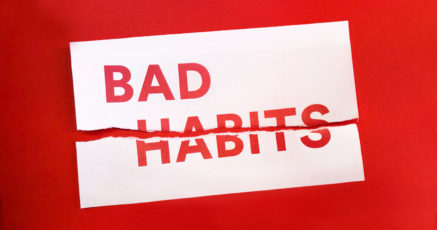
Let's be honest, you have a bad habit that you can't seem to kick, not matter how many times you try to quit, cold-turkey. Whether it be smoking, picking your nose, cracking your knuckles, chewing with your mouth open, mindlessly scrolling on social media, we all have a bad habit here and there, and stopping a habit is no easy task. A study by Judson Brewer M.D. from Brown University, 60% of people who try to quit a habit with sheer will power alone, end up relapsing. I'm sure you've felt this failure just like me: you quit the habit, go a few days, maybe a month, and then you drop all progress to go back to the status quo. Humans are designed to be habitual creatures, it's what guaranteed our survival before civilization, something becomes a habit so you dedicate less brain power on something small so your brain can focus on avoiding dangers and finding food. Now a days, we aren't fending off predators and slacking off won't lead to us starving to death, but we still have the ability to form habits because that's what got us to where we are today, as such, beating a deeply ingrained behavior is no small feat. One must be methodical, plan, and strategize a way to beat the old habit.
Quitting "cold-turkey" is just too abrupt of an adjustment, and your brain will actively crave your old habit to return to normalcy. So one of the best methods to kicking a habit, is setting small, easily attainable, goals. Your brain releases dopamine (the reward hormone) when you achieve a goal. Habits also release dopamine to encourage repeat behavior. Chemically this is why hard stopping usually fails, your brain is getting a sudden drop of dopamine, making you feel generally awful. Now if we slowly limit our bad habit while also slowly doing a simple yet rewarding task, you wont be losing out on dopamine, it's just coming from a better source.


For example, lets say you start cracking your knuckles because it made your hands feel less stiff in a hurry, you repeat this behavior over time, and before you know it, you're just cracking your knuckles without thinking about it. Your hands then feel stiffer as the seconds pass, and your hands ache because you just cracked your knuckles and are trying again thanks to your awareness of the problem. So what can we do to fix it? Well, I have personally found that squeezing a stressball helps when the need to crack occurs. The squish of the ball feels nice in my hand, it also provides a bit of resistance, giving my fingers a bit of a work out, and my brain is now focused on the ball rather than the knuckles. After I get tired of squeezing the ball, my hands feel more relaxed and don't ache from repeated crackings.
No one person will have the same method for beating a bad habit. The key is to find the right method for you and repeat it. The more you repeat it, the more it will ingrain in your brain. Now if this is a chemical habit, like nicotine addiction, it may be harder to quit with a normal method like this. Seek help if your withdrawals are particularly bad. There is no shame to admitting your addiction and seeking help. It shows that you have the strength to recognize a problem, and take steps to fix it.
It's your life, be proud that you are trying to improve it by kicking bad habits. Don't be ashamed of your faults and failures, because you have the strength to seek a happier and healthier life, and at the end of the road, you can hold your head up high and proud in spite of those who didn't believe in you, and those who supported you will be all the more proud of your accomplishments.
No comments:
Post a Comment